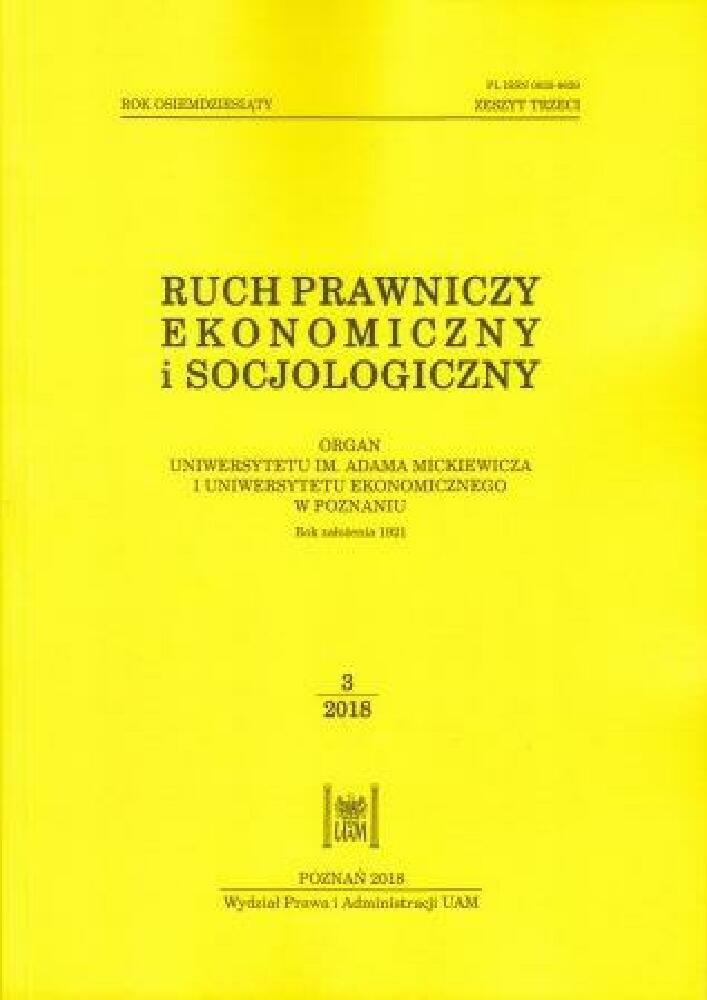Abstract
The existence of honour as a particular value is not unique, restricted to the boundaries of certain states, nationalities or ethnicities only. Yet, a distinction can be found in the literature between so-called ‘societies of honour’ and ‘modernised societies’. It is believed that in ‘societies of honour’ honour plays a central role in regulating social relations, and in ‘modernised societies’ based on the rule of law its importance is marginalised. This article is a contribution to the discussion on the adequacy of the discussed division based on the example of Polish society. Due to the fact that an important feature of this distinction is the juxtaposition of law and honour as tools for regulating social relations, the starting point of the analysis of this issue is to answer the question whether the concept of ‘honour’ exists in Polish law, and if so, how it is defined and in what contexts it appears. Due to the complexity of this issue, the subject of the article was limited to a specific problem – the analysis of selected judgments of Polish courts and the reasons underlying these judgments. The research allowed to identify the provisions of Polish law which refer (or could refer) to honour. Based on the analysis made, it may be stated that both, judges as well as parties to court proceedings, consider honour as a protected, legally accepted value.References
Appiah, A. (2010), The Honor Code: How Moral Revolutions Happen, W.W. Norton & Company.
Baxter, V., Margavio, A.V. (2010), Honor, self and social reproduction, Journal for the Theory of Social Behaviour 41(2): 121–142.
Berger, P. (1970), On the obsolescence of the concept of honor, European Journal of Sociology 11(2): 339–347.
Bourdieu, P. (2004), Męska dominacja, tłum. L. Kopciewicz, Warszawa.
Cambell, J. (1992), The Greek hero, [w:] Peristiany, J.G., Pitt-Rivers, J. (eds.), Honor and Grace in Anthropology, Cambridge University Press, Cambridge: 129–150.
Cooney, M. (1998), Warriors and Peacemakers. How Third Parties Shape Violence, New York University Press, New York.
Eck van, C. (2003), Purified by Blood: Honour Killings amongst Turks in the Netherlands, Amsterdam University Press, Amsterdam.
Gilmore, D. (ed.), (1987), Honor and shame and the unity of the Mediterranean, American Anthropological Association. Special Publication (Book 22), Washington.
Welchman, L., Hossain, S. (eds.), (2005), ‘Honour’. Crimes, Paradigms, and Violence Against Women, Zed Books, London.
Gill, A. (2014), Introduction: ‘honour’ and ‘honour’-based violence: challenging common assumptions, [w:] Gill, A.K., Strange, C., Roberts, K. (eds.), ‘Honour’ Killing and Violence: Theory, Policy and Practice, Palgrave Macmillan, Basingstoke: 1–23.
Gill, A. (2011), Reconfiguring ‘honour’-based violence as a form of gendered violence, [w:] Idriss, M.M., Abbas,T. (red.), Honour, Violence, Women and Islam, Routledge, Abingdon: 218–231.
Habermas, J. (2002), Teoria działania komunikacyjnego. Tom II – Przyczynek do krytyki rozumu funkcjonalnego, tłum. A. Kaniowski, Warszawa.
Janssen, J. (2009), Your Honour of Your Life?, Haga.
Latif, Z. (2011), The silencing of women from the Pakistani Muslim Mirpuri community in violent relationships, [w:] Idriss, M.M., Abbas, T. (eds.), Honour, Violence, Women and Islam, Routledge, Abingdon: 29–41.
Nisbett, R., Cohen, D. (1996), Culture Of Honor: The Psychology of Violence in the South, Westview Press, Boulder.
Payton, J. (2011), Collective crimes, collective victims: a case study of the murder of Banaz Mahmod, [w:] Idriss, M.M., Abbas, T. (eds.), Honour, Violence, Women and Islam, Routledge, Abingdon: 67–79.
Pitt-Rivers, J. (1966), Honour and social status, [w:] Peristiany, J. (ed.), Honour and Shame: The Values of Mediterranean Society, University of Chicago Press, Chicago: 19–77.
Radwański, Z. (2003), Prawo cywilne – część ogólna, C.H. Beck, Warszawa.
Sadomski, J. (2011), Ochrona czci (dobrego imienia) w polskim prawie cywilnym i karnym – analiza porównawcza, [w:] Siemaszko, A. (red.), Stosowanie prawa. Księga jubileuszowa z okazji XX-lecia Instytutu Wymiaru Sprawiedliwości, Wolters Kluwer, Warszawa: 96–160.
Stewart, F.H. (1994), Honor, The Chicago University Press, Chicago.
Weber, M. (2002), Gospodarka i społeczeństwo, tłum. D. Lachowska, WN PWN, Warszawa.
Yeşilgöz, Y., Harchaoui, S. (2003), Eer voor beginners, [w:] Bovenkerk, F., Komen, M., Yeşilgöz, Y. (ed.), Multiculturaliteit in de strafrechtspleging, Haga.
License
Copyright (c) 2018 WPiA UAM

This work is licensed under a Creative Commons Attribution-NonCommercial-NoDerivatives 4.0 International License.




